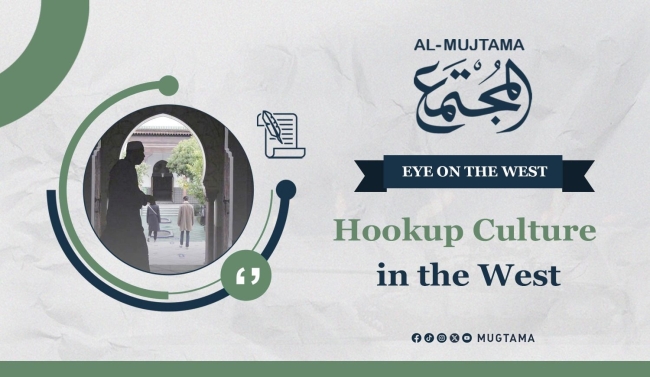In contemporary society, particularly in Western cultures, a concerning trend has emerged: the normalization of casual relationships. This phenomenon, often referred to as "hook-up culture," involves engaging in superficial, temporary physical relationships without any emotional or long-term commitment. Promoted by media and social platforms as a symbol of personal freedom and self-expression 1, this culture raises critical questions: Does such unbridled liberty lead to happiness, or does it instead create an inner void and undermine human nature? Is it true freedom, or merely the enslavement to desires and pleasures?
What is the Hook-up Culture?
Hook-up culture promotes the idea that one can have physical intimacy with another person without any lasting commitment or connection. This culture grows in an environment that celebrates absolute individualism, reducing the value of the relationship between the sexes to mere momentary gratification. It thrives particularly among young people in universities and large cities, where moral and religious awareness is absent, replaced by an insatiable desire for experimentation and temporary pleasure.
According to a study published by "Psychology Today," this phenomenon is closely linked to deteriorating mental health, as young people participating in these relationships suffer from anxiety and depression due to emotional emptiness. What initially appears as freedom and independence quickly turns into a heavy psychological burden that is difficult to overcome.
Participation in this culture trains the mind to ignore emotions and responsibility, affecting how young people form relationships in the future. This is evident in the prevalence of television programs in the West centered around children whose fathers are unknown. The mother comes to the program to conduct a DNA test with a group of men, one of whom may be the father. These programs have some of the highest viewership ratings.
Psychological and Social Impacts of Hook-up Culture
Recent research indicates that these relationships are not merely isolated individual experiences but have far-reaching effects on society as a whole. Casual relationships reinforce the concept of selfishness and emotional consumption, turning people into mere tools for satisfying desires, which leads to a breakdown of trust between individuals and the destruction of genuine emotional bonds.
Psychologically, many participants in these relationships suffer from feelings of isolation and depression. A study conducted by Stanford University revealed that participants in casual relationships are more likely to develop psychological disorders such as depression and anxiety compared to their peers who choose to build committed and sustainable relationships.
How can such a society claim to be civilized and cohesive when its members follow their instincts and desires blindly, like animals living by their instincts, leaving behind children without fathers, with some resorting to abortion and killing fetus because they do not wish to bear the consequences of their actions? This leads to numerous psychological issues that reflect the disintegration of their society.
Islam and the Foundation of Strong Relationships
Amid the spread of this phenomenon in Western societies, Islam restores the value and dignity of humans by calling for self-discipline and control over desires. Islam directs human energy toward building relationships based on commitment and mutual respect. The Prophet Muhammad (peace be upon him) said: "Whoever among you can afford to marry, let him marry, for it helps lower the gaze and guard chastity. Whoever cannot afford it should fast, as it will be a restraint for him." (Sahih al-Bukhari)
In Islam, relationships are not merely a means to satisfy desires but a way to achieve tranquility and psychological balance by refining instincts rather than letting them run unchecked. Marriage is the only legitimate way to fulfill physical desires in a manner that preserves human dignity and protects society from corruption and decay.
Marriage in Islam is not just a relationship between a man and a woman, but a solemn covenant based on love and mercy. Allah says: "And of His signs is that He created for you from yourselves mates that you may find tranquility in them, and He placed between you affection and mercy" (Surah Ar-Rum: 21).
Marriage is not only a means of achieving individual happiness but also the cornerstone of building a strong Islamic society. The family is the institution that ensures the upbringing of generations on the correct values and enhances emotional and psychological stability. This is what is missing in societies that adopt the culture of casual relationships, which encourage the disintegration of families and the destruction of deep human relationships.
Facing the challenges of the age
In confronting the culture of casual relationships, we as Muslims must work to promote the culture of marriage and strong family relationships. Islamic societies must provide young people with support and counseling to direct their energies toward building stable families. Education and the media play a crucial role in reintroducing the model of the Muslim family as a successful and sustainable example. There must be continuous awareness about the dangers of casual relationships and their negative effects on mental and physical health, with a focus on the importance of marriage in building a cohesive and stable society.
In conclusion, Islam does not forbid human relationships but refines and directs them toward the higher goal of achieving a balance between the needs of the body and the spirit, and building a strong society based on respect and mercy. We must reconsider the impact of the culture of casual relationships on Muslim societies and strive to strengthen the values of family and marriage that make both the individual and society resilient in facing the challenges of the modern age.
-------------------------------------------------------------


